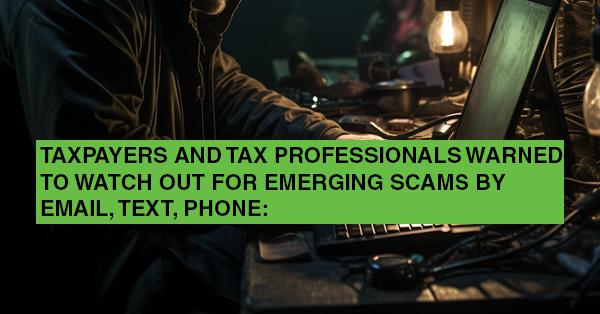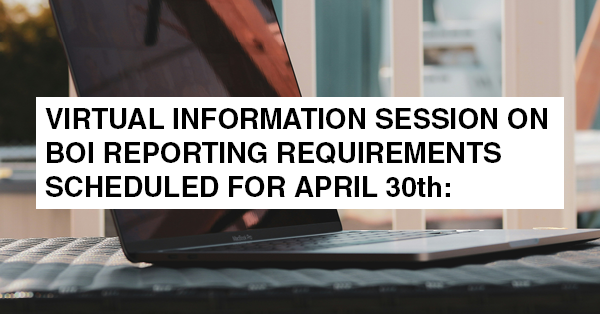TAXPAYERS AND TAX PROFESSIONALS WARNED TO WATCH OUT FOR EMERGING SCAMS BY EMAIL, TEXT, PHONE:

Taxpayers and tax professionals are urged to be alert to fake communications posing as legitimate organizations in the tax and financial community, including the IRS and states. These messages can arrive in many ways, including an unsolicited text or email to lure unsuspecting victims to provide valuable personal and financial information that can lead to identity theft. These include:
- Phishing is an email sent by fraudsters claiming to come from the IRS or another legitimate organization, including state tax organizations or a financial firm. The email lures the victims into the scam by a variety of ruses such as enticing victims with a phony tax refund or frightening them with false legal/criminal charges for tax fraud.
- Smishing is a text or smartphone SMS message that uses the same technique as phishing. Scammers often use alarming language like, "Your account has now been put on hold," or "Unusual Activity Report" with a bogus "Solutions" link to restore the recipient's account. Unexpected tax refunds are another potential target for scam artists.
- Vishing scams may be perpetrated through a call with an actual person or robocalls. Criminals can spoof numbers that belong to real companies or impersonate call center professionals. It usually comes as a phone call that sounds urgent or alarming. An unsolicited caller tells you your bank account has been compromised, and that they need your PIN so they can verify your identity or unlock the account. Or they say they’re from a government agency, such as the IRS or the Social Security Administration. Sometimes they insist you owe money. Or they might announce you’re a lucky winner — but you’ll need to pay for shipping and handling to claim your prize.
The IRS initiates most contacts through regular mail, which means taxpayers will not be getting an unexpected message by email, text or social media regarding a bill or tax refund.
Tax professionals and others are reminded never to click on any unsolicited communication claiming to be the IRS or others because it may surreptitiously load malware. It may also be a way for malicious hackers to load ransomware that keeps the legitimate user from accessing their system and files.
Taxpayers can also report scams to the Treasury Inspector General for Tax Administration or the Internet Crime Complaint Center. The Report Phishing and Online Scams page at IRS.gov provides complete details. The Federal Communications Commission's Smartphone Security Checker is a useful tool against mobile security threats.
The IRS also warns taxpayers to be wary of messages that appear to be from friends or family but are possibly stolen or compromised email or text accounts from someone they know. This remains a popular way to target individuals and tax preparers for a variety of scams. Individuals should verify the identity of the sender by using another communication method; for instance, calling a number they independently know to be accurate, not the number provided in the email or text.
Signs that a scam may be underway:
Taxpayers should watch for a number of tell-tale signs that could be an indication that they have been a victim of identity theft or a tax scam. Among some of the signs are:
- Taxpayers receiving a tax transcript in the mail from the IRS that was not ordered.
- Taxpayers receiving an unrequested Employer Identification Number.
- Taxpayers receiving W-2's from an unknown employer.
- Taxpayers unexpectedly getting a notice or an email from a tax preparation company that is:
- Confirming access to an existing online account.
- Disabling an existing online account.
- Confirming a new online account.
- Getting a letter from the IRS during a year that the taxpayer didn't earn income or a tax return hadn't been filed. In this situation, it's possible an identity thief has submitted a tax return in the honest taxpayer's name. In this situation, where the taxpayer didn't earn money or file a return, the warning sign is a letter showing:
- Additional tax is owed.
- A refund was offset because of a balance due.
- Collection actions have been taken.
Generally, the IRS starts with a mailed paper bill to a person who owes taxes. If a taxpayer wants to verify what taxes they owe the IRS, they should tax account information. But they should not click on links in email or texts saying they owe a bill.






